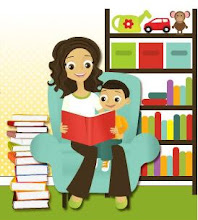Now consider this: In some states, as many of 20-30% of children are living in poverty. Poverty is one factor that potentially places children at risk for academic difficulty and/or failure. Children living in poverty may:
- have limited time with adults (because they are working or because there is only one adult in the household);
- live in dangerous neighborhoods;
- have parents with limited education;
- not have role models who read or value education;
- have little awareness of or access to community resources (like libraries);
- attend low-achieving schools with few resources;
- not have access to books in the home because of the family's financial limitations; and/or
- be more likely to experience difficulties such as abuse, neglect, homelessness, unstable households, or violence.
- Libraries in low-income neighborhoods should continue to reach out to the community and provide some programs geared directly to boys. This may mean having more magazines and comic books in the children's areas. Keep in mind that there are differing opinions when it comes to the topics that interest boys.
- Mentoring and after-school programs that cater to youth should provide reading and literacy opportunites that are specific to the interest of boys.
- Schools and libraries in low-income areas can partner to help families understand the resources that are available.
- Schools in low-income neighborhoods should try (when funds are available) to ensure that school libraries have books that boys will enjoy (comics, magazines, non-fiction books, graphic novels, audio books, etc).
- I know in these times of school accountability and standardized testing, it's hard for teachers to tailor lesson plans and activities to the needs of their students. But when possible, teachers should provide boys with books that will interest them. They should consider that boys learn differently and allow more active learning and movement during reading activities.
- Schools and Child Care Programs in low-income areas should connect with the families and provide parent education programs and parent tutoring programs. Parents may not understand the value of reading to children. They may also have limited reading skills themselves so they may need literacy training.
- Encourage boys to read books that have been made into movies. One expert suggests that reading books AFTER seeing the movie may gain boys' interests and may aid in their comprehension of the story.
- States should provide additional training for child care teachers on the importance of literacy. The early learning years are crucial and sometimes by the time children reach kindergarten, they are already lagging in necessary language and literacy skills.
- Schools and teachers in at-risk areas can look for mentors and mentoring programs that may provide male volunteers to read to the class on a regular basis.
- Alter (but NOT lower) expectations for boys when it comes to reading. Boys may need to read in shorter intervals. They may need to be more active while reading. They may not want to sit at a desk and read. Be flexible whenever possible.
- Search for valuable computer language/literacy programs and games. Boys are usually more active learners and technology can be used to encourage literacy skills.
- Find local organizations (in our area we have Baltimore Reads) that support literacy. Baltimore Reads also has a book bank that provides free books to schools and to families. They also have literacy training for adults.
- Schools and Early Childhood Programs working with at-risk populations should seek out organizations that focus on boys and reading such as:
- Guys Read
- Boys Read
- Getting Boys To Read
- Michael and Mechelle Epps Foundation
- Boys Life Reading Contest (deadline 12/31/11)
- Reading Rockets
- Recognize that many of the children living in poverty are minorities so seek out resources that will be helpful to children and families:
What are your communities doing to address the specific needs of at-risk learners?
What reading programs or other resources do you know of that cater to the interest of boys?



























![Alexander and the Terrible, Horrible, No Good, Very Bad Day [ALEXANDER & THE TERRIBLE HORRI]](http://ws.amazon.com/widgets/q?MarketPlace=US&ServiceVersion=20070822&ID=AsinImage&WS=1&Format=_SL160_&ASIN=B002E9Q54A&tag=earlyliteracycounts)


![Pete's a Pizza [PETES A PIZZA 62/E]](http://ws.amazon.com/widgets/q?MarketPlace=US&ServiceVersion=20070822&ID=AsinImage&WS=1&Format=_SL160_&ASIN=B001T36MKY&tag=earlyliteracycounts)



























